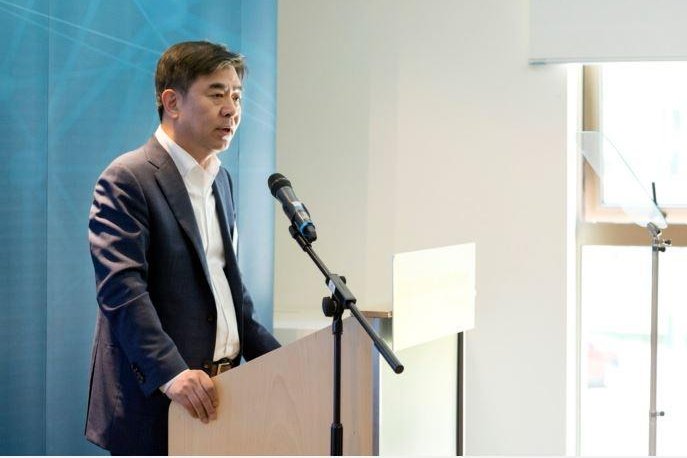Samsung's Kim Hyun-Suk announces the establishment of three new artificial intelligence centers, in Toronto, Moscow and Cambridge, England. Photo courtesy of Samsung
May 23 (UPI) -- Samsung announced Wednesday that its research and development division will establish three new artificial intelligence centers to exploit user-centered AI.
Facilities will open in Toronto, Moscow and Cambridge, England. Samsung Research, a division of the South Korea-based conglomerate, said it will employ about 1,000 advanced AI researchers by 2020.
The company said its research for household products will be driven by "user-centric" needs, a common architecture for its products and continuous self-learning by its machines.
Samsung aims to put AI features and Internet connectivity onto all its products by 2020, although it has yet to market a voice-activated tabletop speaker to take users' commands, such as Amazon and Google. The goal of Samsung's AI is to transform its household appliances into an army of synchronized devices capable of understanding verbal commands.
The number of homes worldwide using at least one wireless-connected "smart home" device is expected to reach 280 million by the end of 2022, a fivefold increase from 2017, according to market research firm ABI Research. Samsung alone sells 500 million individual household devices annually around the world.
Samsung's virtual assistant and AI focus is named Bixby, a speaking order-taker similar to Amazon's Alexa or Apple's Siri. Bixby will eventually take direction from up to 10 voices, instead on one in his current duty as the voice of Samsung's Galaxy S8 smartphone. Early Samsung efforts to place AI in homes failed because the company focused on individual products instead of a cohesive, multi-room format, Samsung AI director Kim Hyun-suk, told the Wall Street Journal. Competitors gained an early advantage, he said.
Samsung nonetheless has a strong presence in the United States with a wide range of products, unlike Chinese rivals, as well as access to the Chinese market.
The company also announced several new innovations on Wednesday in silicon technology to better manufacture "systems-on-chips" for a wide range of applications.















